Any Dylan fan has enjoyed theFreewheelin' album many times over. For the first 32 years of my listening enjoyment of Dylan's music, I had always loved Talkin' World War III Blues, accepting at face value Dylan's quote of Abraham Lincoln in the last verse. I can't recall wondering very seriously during this period whether or not Lincoln had really said such a thing. There was so much parody in the song that I assumed this could be poetic license to fit the mood of the piece. I liked that Dylan chose to position his own thoughts next to those of this other great American.
But then in the 33rd year of my listening enjoyment a librarian friend of mine, a stickler for the facts as he is, suggested that I might look into the actual origin of the quote, raising the issue of the veracity of Dylan's attribution. The idea intrigued me.
Perhaps I was chosen for this task because I was born and raised in Illinois, The Land of Lincoln, as the license plates of the state declare. I grew up in central Illinois, 35 miles east of Springfield, the state capital, and Lincoln's home for all of his legal career and much of his political career. His home there is still a popular tourist attraction for those visiting this heart of the midwest. Every day on my way to high school, I passed a park which had a log cabin court house where Lincoln had presented cases before his life in politics.
I started the project by refreshing my memory from the lyrics book version of the song.
Well, now time passed and now it seems
Everybody's having them dreams.
Everybody sees themselves walkin' around with no one else.
Half of the people can be part right all of the time,
Some of the people can be all right part of the time,
But all of the people can't be all right all of the time.
I think Abraham Lincoln said that.
"I'll let you be in my dreams if I can be in yours."
I said that.
I found this to be a slightly cleaned up version of the actual performance on the Freewheelin' album.
Well, now time passed and now it seems
Everybody's havin' them dreams.
Everybody sees hisself walkin' around with no one else.
Half the people can be part right all of the time, an'
Some of the people can be all right part of the time,
But all the people can't be all right all of the time.
I think Abraham Lincoln said that.
"I'll let you be in my dream if I can be in yours."
I said that.
For completeness I decided to also listen to the performance of the song in the famous 1964 Halloween concert.
Time passed and now it seems
Everybody's havin' them dreams.
Everybody sees hisself walkin' around with no one else.
Well, some of the people can be part right all of the time,
All the people can be some right part of the time,
Part of the people can be some right all of the time,
But all the people can't be all right all of the time.
Carl Sandburg said that. [laughter and clapping]
"I'll let you be in my dream if I can be in your dream."
I said that.
What?!! As originally written, Dylan was saying he "thought" Lincoln said it, and now a year and a half later he positively declares it was Carl Sandburg who said it. What's that all about?? Did he have it wrong to begin with, and someone had come along to correct him on it?

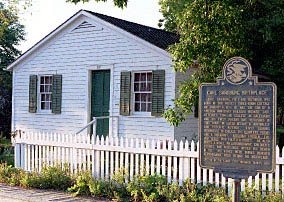 Things were getting interesting, especially because Carl Sandburg (1878-1967), a poet, folklorist and
noted Lincoln scholar, was also a native of Illinois. In fact, we were both
born in Galesburg, a small town near Peoria in northern Illinois. As a young boy Sandburg listened to stories of old-timers who had personally known Abe Lincoln! At the age of nineteen he traveled as a hobo, learning folk songs along the way which he later played on his Jester guitar at speaking engagements.
Things were getting interesting, especially because Carl Sandburg (1878-1967), a poet, folklorist and
noted Lincoln scholar, was also a native of Illinois. In fact, we were both
born in Galesburg, a small town near Peoria in northern Illinois. As a young boy Sandburg listened to stories of old-timers who had personally known Abe Lincoln! At the age of nineteen he traveled as a hobo, learning folk songs along the way which he later played on his Jester guitar at speaking engagements.
When I was very young and still living in Galesburg we used to visit the Stilsons, family friends who had been our neighbors before my father had built us a new home on the other side of town. Art Stilson, a large jovial man, was a collector of interesting tidbits. Whenever we came to visit he would have some interesting article to show us that he had recently clipped from a newspaper or a magazine. Or he would play us a new record he had discovered, such as the times we howled with laughter over the Victor Borge record, or Spike Jones at other times.
Uncle Art, as we called him, was also a big fan of Carl Sandburg, who was the most famous and worthy gentleman our hometown had ever produced. The town even to this day proudly displays Sandburg's birthplace home (shown above) to the visiting tourists. Uncle Art would sometimes have clippings about what Sandburg had said, or samples of his poetry, and he certainly had Sandburg's definitive book on the years Lincoln lived and worked in Illinois, Abraham Lincoln: The Prairie Years.
This all came back to me on Halloween 1998 when I was looking through the vinyl records on sale at my local CD shop. Suddenly I chanced upon a two record set of Sandburg reading from his studies on Lincoln, The Prairie Years and The War Years. The double album (Caedmon TC 2015) looked decidedly familiar, as I'm sure it was included in Uncle Art's collection. So I shelled out my 83 cents and brought the album home as a reminder of some pleasant childhood memories.
At the time I didn't even listen to the album, as my turntable had gone into storage some years earlier after I had replaced all my Dylan albums with their CD counterparts. In fact I didn't even examine the liner notes carefully, which is unfortunate, because it was only 30 days earlier that my librarian taskmaster had suggested the project of tracking down the Lincoln quote, as there was a clue to the answer right there on the liner notes. When I finally examined the album more carefully some months later, I discovered it read:
Suddenly it all came together! Dylan was right in both versions of the song!! Sandburg HAD said it, but he was quoting Lincoln when he did so!
Although the liner notes refer to 1860, in the recording our key quote came from a time period which Sandburg identifies as 1858. Here is a transcription of the Sandburg reading about that quote, which occurs at the very end of the first of the four sides.
Lincoln: Springfield, 1860
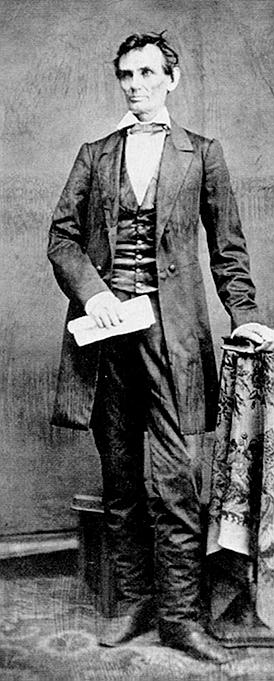 From: A Lincoln Album: Readings by Carl Sandburg. Caedmon TC 2015, 2 LP set,
(c) 1957, last 2:25 of Side 1.
From: A Lincoln Album: Readings by Carl Sandburg. Caedmon TC 2015, 2 LP set,
(c) 1957, last 2:25 of Side 1.
And that year [1858] in Bloomington, Illinois he read a lecture on "Discoveries
and Inventions," repeating it later in Springfield. Scheduled a second time in
Bloomington, he met so small an audience that he didn't bother to read his
paper. He soon dropped the idea of becoming a popular lecturer.
What he read revealed him as a droll and whimsical humorist, a scholar and
thinker, a keen observer and a man of contemplation, who if fate ordained,
could have a rich and quiet life entirely free from political ambitions. He
touched on man's first discovery or invention of clothes, of speech, of
windpower for sailing, of the alphabet, of printing.
Rulers and laws in the past had made it a crime to read or to own books, and he
said, "It is difficult for us now and here to conceive how strong this slavery
of the mind was, and how long it did, of necessity, take to break its shackles,
and to get a habit of freedom of thought established. A new country such as
America is most favorable, almost necessary to the emancipation of thought and
the consequent advancement of civilization and the arts." Dominant in the
paper he read was a love of books, of pure science, of knowledge for its own
sake, of a humanity creeping out of dark mist toward clear light.
Somewhere in this period, Milton Hay of Springfield heard Lincoln speak
offhand a rule or maxim in politics. Hay later passed it on to Joseph
Fifer of Bloomington who found it so simple, so nicely singsong, that
he couldn't forget it:

Mystery solved! As I discovered when I first began searching for this maxim, it is not one of the most common quotes attributed to this oft quoted man. When the Sandburg album was released in 1957, Dylan was still in high school, performing with his most famous Hibbing band, The Golden Chords. It seems likely that Dylan first learned of the quote because his fellow Midwesterner made it better known by way of his book and then the Caedmon album. Perhaps when Dylan wrote Talkin' World War III Blues he couldn't remember where he heard the quote, but he thought it was Lincoln.
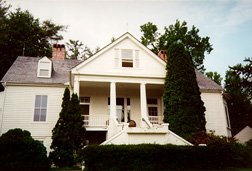 Less than a year after he wrote the song, in February 1964, Dylan insisted upon dropping in on Sandburg on his farm in North Carolina (left) during his twenty day driving tour from New York to California. Scaduto says Dylan told Sandburg that Woody Guthrie had talked about him a lot, and in his description of the meeting, Spitz claims Sandburg was one of Dylan's idols. The visit lasted only a half hour on the front porch of the large farmhouse.
Less than a year after he wrote the song, in February 1964, Dylan insisted upon dropping in on Sandburg on his farm in North Carolina (left) during his twenty day driving tour from New York to California. Scaduto says Dylan told Sandburg that Woody Guthrie had talked about him a lot, and in his description of the meeting, Spitz claims Sandburg was one of Dylan's idols. The visit lasted only a half hour on the front porch of the large farmhouse.
Some have claimed that Dylan was disappointed that Sandburg had not already heard of him, but Pete Karman, one of the three friends traveling with Dylan, told Spitz, "Without looking at each other, I could tell we were equally amazed. I distinctly felt like there was a passage of honor between the young prince and the old king. It was a sincere, no-bullshit, no show-biz moment, and we all noted it respectfully." Dylan presented Sandburg with a copy of his newly released album, The Times They Are A-Changin', and Karman insists that everyone left in "a bouyant mood." There is no indication that there was any discussion of the Lincoln quote in Dylan's song. Perhaps Dylan used the Sandburg lyric variation that Halloween at his concert in New York at Philharmonic Hall simply as a homage to the poet, surely an indication of his good will toward the man. Or perhaps by then he had become conscious of Sandburg's publicizing of the Lincoln quote in either his book or album, and wanted to see whether anyone would notice the connection between the two.
Perhaps some day a Dylan interviewer can find out whether Dylan recalls how he came to use the Lincoln quote in the first place, and then later decided upon the Sandburg variation.
 Having listened to the Sandburg reading on the Caedman LP, it was time for a visit to the library to look up the quote in Sandburg's original books. The Sandburg works on Lincoln were originally published in the two volume
Abraham Lincoln: The Prairie Years (1926), followed by the four volume Abraham Lincoln: The War Years (1939). A discussion of the lecture on "Discoveries and Inventions" was located in The Prairie Years, (Vol 2, Chpt 132, p. 237-244) but not worded the same as the reading on the LP, and the political maxim could not be found in any of the original six volumes, in spite of a considerable amount of searching.
Having listened to the Sandburg reading on the Caedman LP, it was time for a visit to the library to look up the quote in Sandburg's original books. The Sandburg works on Lincoln were originally published in the two volume
Abraham Lincoln: The Prairie Years (1926), followed by the four volume Abraham Lincoln: The War Years (1939). A discussion of the lecture on "Discoveries and Inventions" was located in The Prairie Years, (Vol 2, Chpt 132, p. 237-244) but not worded the same as the reading on the LP, and the political maxim could not be found in any of the original six volumes, in spite of a considerable amount of searching.
And for good reason. As it turns out, the Caedmon LP's are not readings from the original six volumes, as was implied by the liner notes. Instead, Sandburg was reading from his one volume edition published in 1954, Abraham Lincoln: The Prairie Years and The War Years. The above exerpt from the LP was a reading from page 150-151 of this later edition, which can still be purchased on the Internet at Amazon.com.
In the Preface to this edition, Sandburg mentioned that he had included new material resulting from the nearly thirty years of intensive research on Lincoln since the publication of his first two volumes. In the Sources and Acknowledgments appendix (p. 746-7) Sandburg tells where he found the maxim Dylan later used in his song. James O'Donnell Bennett wrote the first book to include the story about Milton Hay recounting the Lincoln quote to Joseph Fifer, his Private Joe Fifer (1936). Fifer was later a Civil War soldier and eventually became the governor of Illinois. The Bennett book quotes Fifer as saying, "In 1894, after my term as governor, I made a speech in Piatt County, this state, in which I repeated what Milt Hay had told me. The speech was printed in the St. Louis Globe-Democrat, the Chicago Inter-Ocean and other papers and thus the saying was first given publicity. None of the Lincoln biographers had ever discovered it." In Sandburg's one volume edition (p. 154) he described Fifer as "a man of unusually accurate and tenacious memory," which gives us some confidence that the Lincoln quote was accurately reported.
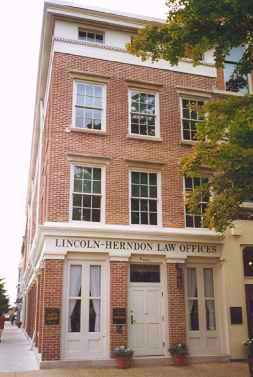
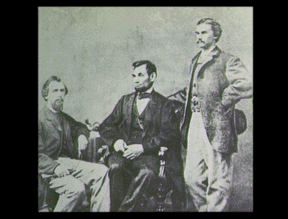 And who was this Milton Hay who got to hear the maxim directly from Lincoln? He was a lawyer who had an office on the same floor as the Lincoln-Herndon law offices in Springfield at the time of the now famous quote. The restored office in the picture is the one that Lincoln occupied from 1843 to 1852. In 1852 he moved the law office to another nearby building, which we presume is where Milton Hay had his nearby office.
And who was this Milton Hay who got to hear the maxim directly from Lincoln? He was a lawyer who had an office on the same floor as the Lincoln-Herndon law offices in Springfield at the time of the now famous quote. The restored office in the picture is the one that Lincoln occupied from 1843 to 1852. In 1852 he moved the law office to another nearby building, which we presume is where Milton Hay had his nearby office.
Milton Hay had a nephew, his namesake John Milton Hay (1838-1905), who came to Springfield after graduating from Brown University (as class poet) to study law with his uncle. He soon met Lincoln, and when Abe was elected President, Lincoln decided to take young John along with him to Washington as his assistant private secretary. John Hay is seen standing next to Lincoln, who is seated next to his other private secretary, John G. Nicolay.
Hay must have made his Uncle Milton proud, as he served in the inner circle at the White House throughout Lincoln's Presidency (1860-64) having daily contact with Lincoln, and for years had the task of writing responses to the flood of mail received by Lincoln. He remembered these duties as follows:
He [Lincoln] was extremely unmethodical; it was a four-years struggle on Nicolay's part and mine to get him to adopt some systematic rules. He would break through every regulation as fast as it was made. Anything that kept the people themselves away from him he disapproved--although they nearly annoyed the life out of him by unreasonable complaints & requests.
He wrote very few letters. He did not read one in fifty that he received. At first we tried to bring them to his notice, but at last he gave the whole thing over to me, and signed without reading them the letters I wrote in his name. He wrote perhaps half-a-dozen a week himself--not more.
Hay later collaborated with Nicolay on an influential biography of Lincoln. He had a long and successful career, both in government and as a successful writer. He served as Ambassador to Great Britain and then Secretary of State for his friend, President William McKinley. He had a hand in the acquisition of the Panama Canal Zone for the US. Camp John Hay in the Phillipines was named after him. This camp was occupied by the Japanese during World War II and later became John Hay Air Base, returned to the Phillipines by the US military in 1979.
Hay's uncle, Milton Hay, apparently had a more ordinary career than either his nephew or his friend Fifer, who became the Governor of Illinois. Perhaps Milt's greatest accomplishment was the preservation of Lincoln's now famous maxim on politics. It certainly provided a fine final verse for Dylan's song!

Last modified: 4/24/99